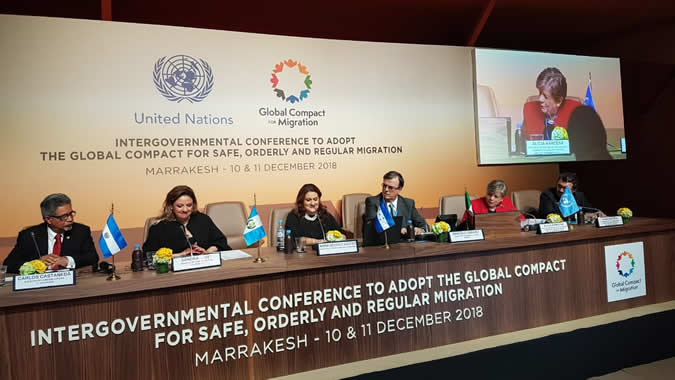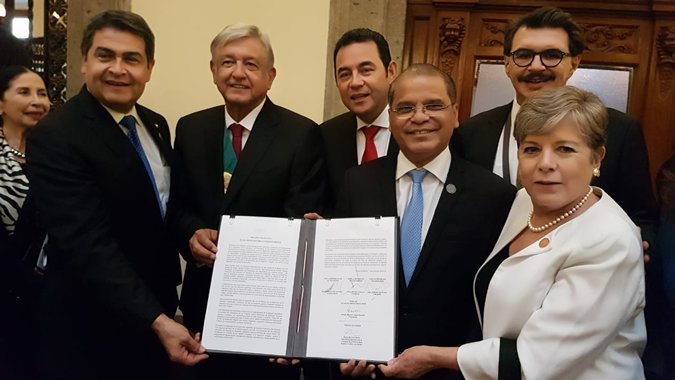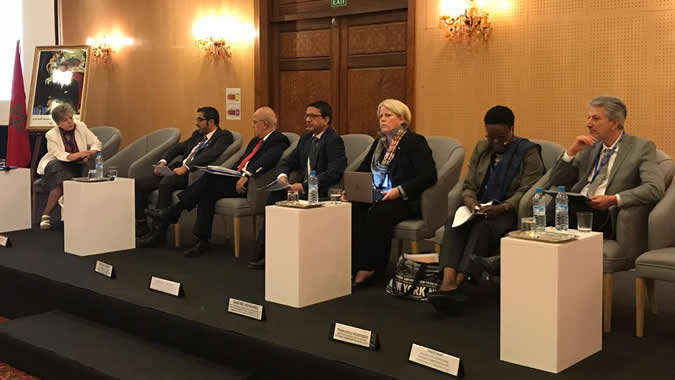Foreign Ministers of El Salvador, Guatemala, Honduras and Mexico Presented Comprehensive Development Plan in the Framework of the Conference on the Global Compact for Migration
Work area(s)
The regional initiative will change the paradigm of migration, development and cooperation between northern Central America and Mexico, under ECLAC’s auspices.

The Comprehensive Development Plan, promoted by El Salvador, Guatemala, Honduras and Mexico, will change the paradigm not only of migration and development but also of cooperation between northern Central America and Mexico, the Executive Secretary of the Economic Commission for Latin America and the Caribbean (ECLAC), Alicia Bárcena, said today in Marrakech.
The senior United Nations official accompanied the foreign ministers María Dolores Agüero, of Honduras; Sandra Jovel, of Guatemala; Carlos Castaneda, of El Salvador; and Marcelo Ebrard, of Mexico, at the initiative’s presentation during a gathering with members of the media in the framework of the Intergovernmental Conference on the Global Compact for Migration, which is being held in Morocco.
ECLAC’s Executive Secretary specified that the Plan contemplates four pillars of action that address the origin, or structural causes, of migration; transit, and how to protect migrants’ human rights on the move; their destination, which addresses regularization and asylum, in those cases where it is required; and return.
She stressed that this proposal aspires to be the first in the region and the world to begin implementation of the Global Compact for Migration and she affirmed that for ECLAC, it is an honor to accompany countries in the design and implementation of the plan, the ownership of which will be key.
Maria Dolores Agüero, the Foreign Minister of Honduras, meanwhile, noted that the initiative contemplates the establishment of a fund for its implementation that includes programs, projects and specific actions for creating employment and fighting poverty, in line with the 2030 Agenda and the Sustainable Development Goals.
“Respecting the dignity of migrant persons will be prioritized in line with international law and with special emphasis on a child’s best interest and the protection of human rights, regardless of migratory status,” she stated.
She also underscored the importance of “our regional commission,” ECLAC.
The Guatemalan Minister of Foreign Affairs, Sandra Jovel, highlighted that the Comprehensive Development Plan addresses the causes of migration, the protection of human rights as well as regularization and reintegration, among other issues to be worked upon jointly.
“This Plan will allow us to improve the mechanisms that have been developed in the framework of the Northern Triangle of Central America and Mexico, which have created joint actions and strategies,” she indicated.
In his remarks, the Foreign Minister of El Salvador, Carlos Castaneda, affirmed that the Comprehensive Plan “goes deep, to the cause and structure of migration problems.”
“Today we are laying the conceptual foundations for building the Comprehensive Development Plan with the purpose of fostering actions with a comprehensive perspective in the entire migratory cycle through a program that will be presented in early 2019 and will respond to our realities as a region,” he said.
The Mexican Secretary of Foreign Affairs, Marcelo Ebrard, meanwhile, recalled that El Salvador, Guatemala, Honduras and Mexico represent 160 million people, which means that the Plan would become the first and most important application of the Global Compact for Migration.
He noted that, for implementation of the Comprehensive Development Plan, the Mexican government will invest just over $30 billion dollars in the next five years and that it will change its migratory policy to respond to the needs of southern Mexico and Central America.
“We have made the commitment to participate in this Comprehensive Development Plan and cooperate and be alongside Honduras, Guatemala and El Salvador, because we have to show the world that this is feasible, possible and effective. It is not enough to indicate that the causes of migration must be tended to, instead we want to demonstrate that this plan is more effective than all the containment measures that one could want,” he stated.
He added that with the Plan, “we want to compete in a successful way with the narrative that has been predominating in much of the world, the Americas included, that the best way to deal with migration is by excluding and controlling.”
The Comprehensive Development Plan seeks to promote development and opportunities in the region, contributing to the prevention of the migratory phenomenon and attacking its structural causes simultaneously.
The initiative was made official via the signing of a joint declaration by the four Presidents of El Salvador, Guatemala, Honduras and Mexico, last December 1, in the framework of the swearing-in of Andrés Manuel López Obrador as President of the United Mexican States.
The declaration emphasizes, among other ideas, the importance of addressing the migratory phenomenon in a joint fashion with a regional viewpoint since no one country can address this complex problem in an isolated way, as the Global Compact for Migration approved today by the conference in Marrakech sustains.
Related content

CEPAL apoyará diseño e implementación de Plan de Desarrollo Integral impulsado por El Salvador, Guatemala, Honduras y México
Alicia Bárcena, Secretaria Ejecutiva del organismo regional, asistió hoy como testigo de honor a la firma de una declaración de desarrollo e inversión, suscrita por los cuatro países en Ciudad de…

Pacto Mundial para la Migración otorga un marco de principios comunes no vinculantes para afrontar un tema transfronterizo por naturaleza: Alicia Bárcena
At the start of her participation in the Intergovernmental Conference for Migration that is being held in Marrakech, Morocco, ECLAC’s Executive Secretary addressed the global agreement’s relevance…

Latin America and the Caribbean vis-à-vis the Global Compact for Safe, Orderly and Regular Migration
Op-ed by Alicia Bárcena, Executive Secretary of ECLAC.

Subregional headquarter(s) and office(s)
Country(ies)
- Latin America and the Caribbean
Contact
Public Information Unit
- prensa@cepal.org
- (56 2) 2210 2040